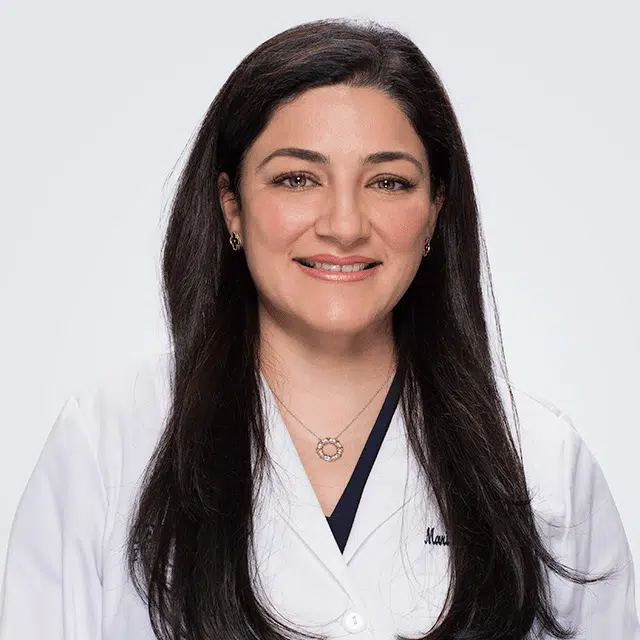Houston Oculoplastic Surgeon
Berkeley Eye Center is now providing state of the art oculoplastic surgery services to our patients. Our Oculoplastic surgeon will deliver the same outstanding quality of treatment that makes the Berkeley Eye Center Houston’s top choice when it comes to vision health and eye care.
Maria Choudhary M.D.
Dr. Choudhary is a double board-certified ophthalmologist who specializes in eyelid and facial plastic surgery, including functional eyelid, orbital, lacrimal and facial reconstructive procedures as well as esthetics.

Our Oculoplastic Services
Oculoplastics is an area of ophthalmology that specializes in cosmetic and reconstructive surgery of the eye and the tissue and bone surrounding the eye. Oculoplastic surgeons are ophthalmologists who have completed additional specialized training after residency, learning the latest knowledge and skills to treat a wide range of conditions that affect the function and appearance of the eye.
Brow and Forehead Lift↗
Brow and forehead lifts can take years off your face. We lift and tighten the skin of the forehead and brow repositioning sagging brows giving these areas a smoother, more youthful appearance.
Bleph Eyelid Lift Surgery ↗
Blepharoplasty surgery can restore a more youthful and alert appearance by removing excess eyelid skin, lifting the eyelids, and removing excess fat around the eyes. It is typically done on an outpatient basis.
BOTOX and Cosmetic Injectibles ↗
BOTOX is a cosmetic injectable used to reduce or eliminate the appearance of facial wrinkles, especially around the eyes. Other options available to our patients include dermal fillers and cosmetic eye surgery.
Eyelid Twitching and Spasms↗
BOTOX is also an effective in treating patients who suffer from an abnormal contraction or twitch of the eyelid, as is drug therapy and microvascular decompression surgery.
Skin & Orbital Tumors ↗
We offer many effective treatment options for cancer of the eye, optic nerve, eye lid or skin around the eye. We will work closely with you to determine the best course of treatment.
Orbital Fractures ↗
Traumatic eye injuries can result in broken bones involving the rim, the floor or entire eye socket. Treatment can range from ice packs, decongestants and an antibiotic in mild cases to surgery to repair deformities.
Eyelid Reconstruction↗
We can help restore the form and the function of the eyelids after a deforming trauma or Moh’s eyelid cancer surgery with our eyelid reconstruction and post-Moh’s reconstruction techniques.
Eye Prosthesis ↗
The damage caused by disease or trauma can be too severe, requiring partial or total removal of the contents of the eye. We can perform safe and effective evisceration, enucleation, and exenteration procedures.
Eye Socket Reconstruction ↗
An evisceration, enucleation, and exenteration procedure often changes the appearance of the eye socket. We use many reconstruction techniques to prepare the anopthalmic socket for a prosthetic eye.
Eyelid Infections & Inflammation↗
Inflammation of the eyelid or eye socket may be indicative of infectious diseases such as orbital cellulitis. Early detection and treatment are the key to curing inflammation and infections of the eye socket.
Eyelid Laxity ↗
We offer many treatment options to patients with eyelid laxity (difficulty keeping eyelids open), lagophthalmos (difficulty closing eyelids) and symblepharon (the eyelids become stuck together).
Lacrimal System Disorders ↗
Do you suffer from dry eyes or wet eyes? Disorders that affect the production of tears or the drainage of tears can result in acute or chronic discomfort of the eye. There are many options available for treating dry eyes and wet eyes.
Temporal Artery Biopsy ↗
Temporal, or giant cell, arteritis (GCA) is an inflammatory condition affecting the medium and large-sized arteries of the head and face that can cause blindness in one or both eyes. GCA causes a many symptoms similar to other conditions, so a biopsy of the temporal artery is often required to establish a diagnosis of temporal arteritis.
Thyroid Eye Disease, Graves’ Eye Disease
We employ a combination of techniques to treat this autoimmune condition, including steroids, Tepezza, surgery and radiotherapy. Most oculoplastic surgery is performed on an outpatient basis, which means patients go home the same day and recovery is fairly quick.
Oculoplastic Surgery Photos










Our Oculoplastic Reviews




